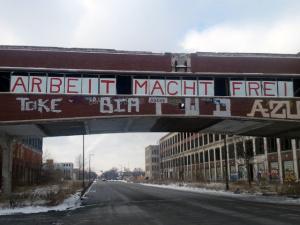Packard Plant Tagged with Nazi Slogan

DETROIT (CBS Detroit) Is it art meant to highlight a decaying industrial complex in a dying city or a chilling threat?
The phrase “Arbeit Macht Frei,” which famously greeted Nazi prisoners at the Auschwitz concentration camp during World War II, has a new home.
It sits prominently on a bridge overlooking the Packard Plant in Detroit. The words are in the same script as the labor camp, but in this case they lord over the hulking plant that once created luxury cars and now serves as a decrepit 40-acre squatting grounds for the homeless, and a favorite spot for scrappers, graffiti artists and ruin porn photography.
The factory that built luxury Packard cars at the start of the 20th Century, closed in 1958. The city of Detroit has pledged to take the plant down, but that hasn’t happened yet.
The German words now prominently displayed on it translate into English as “work will make you free,” and they guarded the gates at the (Auschwitz) camp.
“Each letter is fashioned on a durable piece of plastic that is strongly secured to the overpass with about 80 sturdy ties,” according to DeadlineDetroit.com.
Steve Goldman of the Holocaust Memorial Center (naturally they ask him  ) finds it offensive and thinks it should be removed, even if it is an artistic statement on labor issues, as some believe.
) finds it offensive and thinks it should be removed, even if it is an artistic statement on labor issues, as some believe.
“In a month, when we’re celebrating the freedom of African-Americans — of all Americans from the scourge of slavery — this hearkening back to slave labor in Nazi Germany … it’s just so offensive I almost don’t have words,” Goldman said. Oy vey.
So, what do you think: Should the city take it down?
Thank you for voting!
No, it's a piece of art 51.16%
Yes, it's threatening 48.84%
Threatening, you say? What is it threatening? The words mean "Work Makes You Free." To Germans, work was a necessity for a feeling of accomplishment, it was not thought to be a bad punishment. The meaning of the words on the gate at Auschwitz was that, by working, the people brought there would gain a greater sense of collective purpose, and could then be returned to society as more productive and constructive citizens.
Nothing threatening at all.
Category
Holocaust Industry Exposed, Race- 723 reads









